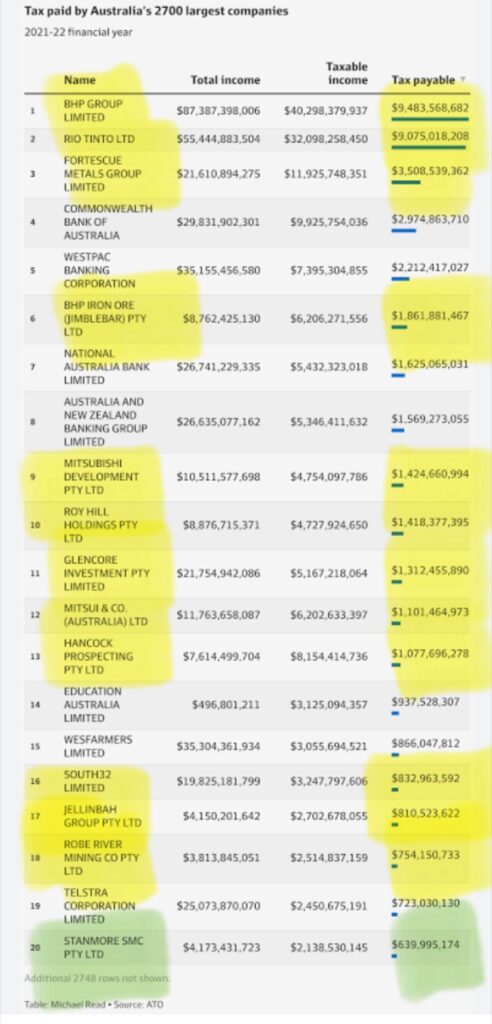With credit to Nick Jorss Executive Chairman at Bowen Coking Coal Ltd and NED at Ballymore Resources Ltd va his Linkedin account.
“The REAL horror of the mining/coal/oil/gas sector is the government support and rebates the industries get. Barely any of the profits from Australia’s resources even touch the Australian economy. Instead the money is quickly moved offshore to multinational conglomerates.”
Let’s have a look at the facts:
1. The mining industry is the highest taxpayer in Australia reaching $63bn of taxes and royalties in 2022 (EY Report – May 23). The ATO reports that large corporates paid a record $83.8 billion in income tax in 2021–22: mining companies represented over 75% of this tax. Without this many of our public services and social programs would not exist.
2. In 2022, 13 of the top 20 corporate taxpayers were mining companies (see attached AFR list). BHP was the top taxpayer in Australia, followed by Rio Tinto (each paying >$9bn). Interestingly, Stanmore Resources Limited the company started by Vaughan Wishart Andrew Martin and myself, snuck in at number 20 contributing a mere $640m in federal taxes! 🤩 Proud dad moment! 😍
3. Queensland’s biggest coking coal miner BMA reported a total tax rate of 62% for the last half, including the world’s highest royalties in this fine state. Doesn’t sound like a subsidy to me!
4. Our own little Queensland company Bowen Coking Coal Ltd. will pay around $100m in State Royalties this year before we return the first dollar to the shareholders who put up the hundreds of million in risk capital to build the mines. Talk about applying a sledgehammer to the golden egg! (Note: Bowen, Stanmore, BMA and many others are mining the coking coal without which we can’t make the steel for required for an energy transition 🙄).
5. Claims of large fossil fuel subsidies in Australia are misleading at best. The research purporting to show this (e.g. The Australia Institute) relies mainly on the diesel rebate i.e., a lower rate of excise available primarily for non-public road users of heavy equipment including mining, tourism, heavy transport, agriculture and off grid power generation. The same lower rate of excise is available to the machinery installing renewables.
6. It’s hard to mount the case that applying a lower rate of taxation (diesel excise) for those who don’t impact our road network (including miners) should be considered a subsidy. For example, I don’t think an Australian earning $120k pa on a top tax rate of 37% would consider they are being subsidised by the government just because they aren’t paying the highest tax rate of 45%. They are still paying considerable tax, and not receiving subsidies, just being taxed at a lower rate than some others.
7. Having said this, I do think it’s likely that we will see increase in true subsidies for fossil fuels over coming years (e.g. the NSW Government paying to extend Eraring coal fired power plant) as a direct result of the drive to close down reliable and dispatchable power in this country without a viable alternative to keep the lights on.
